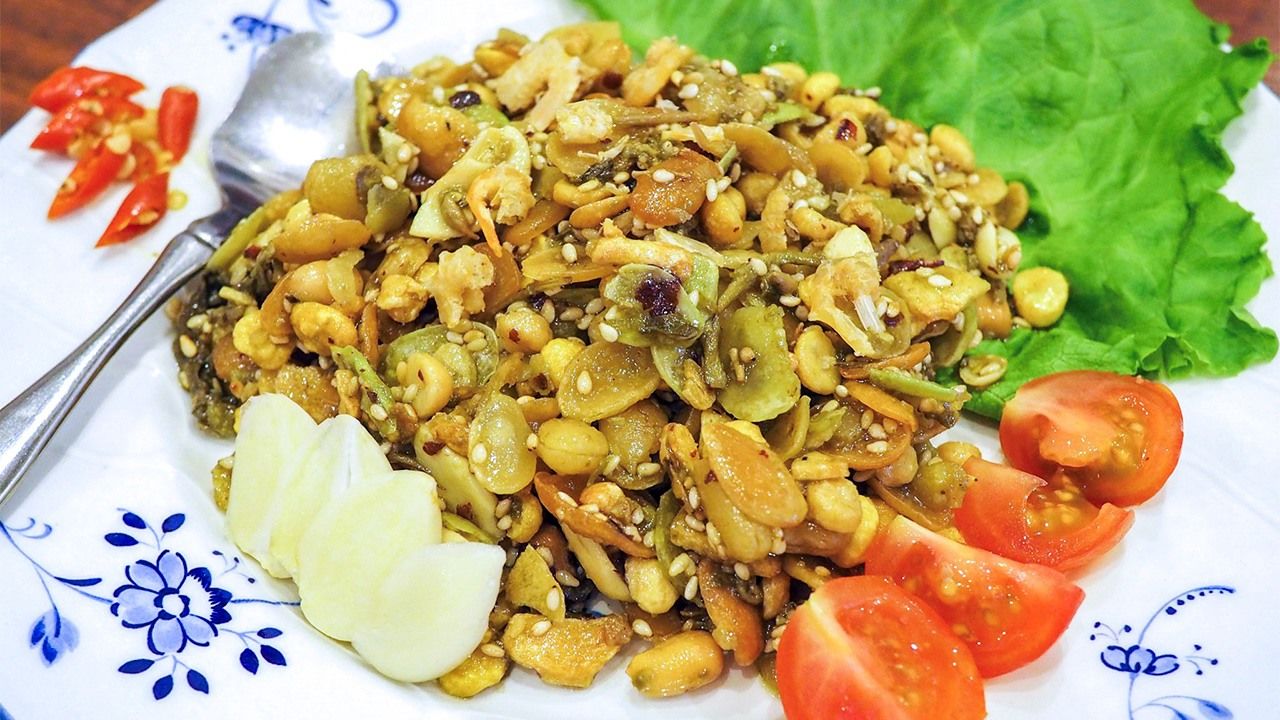
Swe Myanmar: The Hunger for Democracy Lives On at a Takadanobaba Restaurant
Society Food and Drink Politics- English
- 日本語
- 简体字
- 繁體字
- Français
- Español
- العربية
- Русский
In Myanmar People “Eat” Their Tea
It’s a big world out there, and the “conventional wisdom” about food can be very different wherever you go.
When we think of “tea,” for instance, we generally assume it’s a drink. Yet I had heard that in Myanmar people “eat” their tea. What kind of dish could that possibly be? Eager to have my first taste of chewable tea, I turned my feet toward Takadanobaba, a place some have dubbed “Little Yangon” after the name of Myanmar’s largest metropolis, and in particular toward a restaurant called Swe Myanmar.
“Ah hah, you must mean le pet thop. In Japanese that would be ‘tea leaf salad.’ Japanese people seem fascinated by it. They all tell me ‘I’ve never eaten tea leaves before.’ That’s how I found out it was unique to Myanmar.”
The man explaining this to me cheerfully was Than Swe, the proprietor of Swe Myanmar. The le pet thop that his wifem Than Than Kyaing, whipped up for me was utterly unique, like nothing I had ever eaten before.
Le pet thop is a blend of fermented tea leaves with agedōfu fried tofu, chickpeas, peanuts, and other ingredients added in. The aroma of the soft tea leaves and the crisp mouthfeel of the chickpeas was delightful, and my chopsticks made short work of it.
“Tasty, isn’t it?” Than Swe observed. “Le pet thop is the taste of home in Myanmar, and every household’s seasoning is slightly different. Families and groups of friends all chatter and carry on while picking away at le pet thop.”
It struck me that le pet thop would go down perfectly with beer, but I was visiting the restaurant in the middle of a coronavirus state of emergency. I had no choice but to go without, at least this time.
With beer off the table, Than Swe encouraged me to try the danbauk. This is right up there alongside le pet thop as one of Swe Myanmar’s most famous dishes. It’s Myanmar-style seasoned steam rice dish crowned with a mountain of stewed chicken still clinging to the bone.
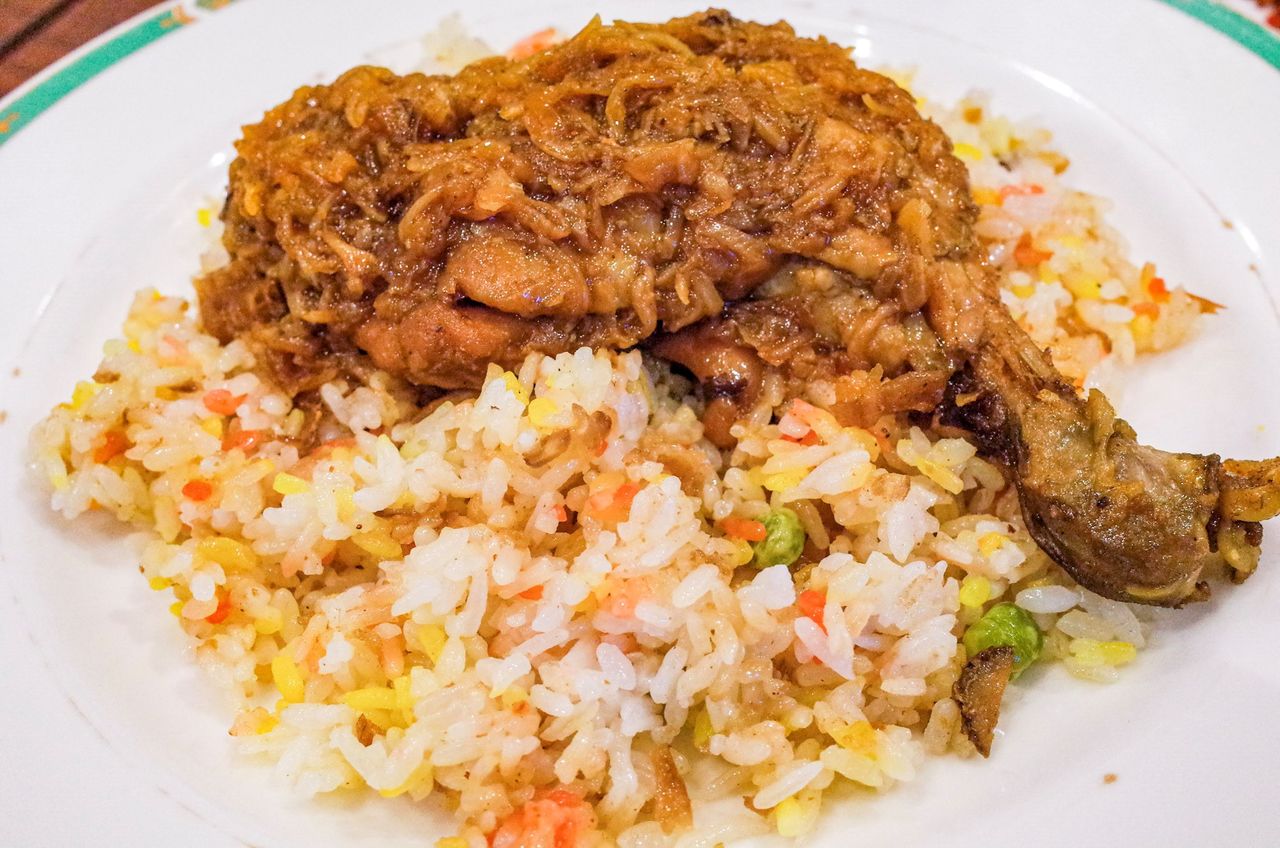
Danbauk, seasoned steam rice crowned with curried stewed chicken (¥950). It’s a lot of volume, but it goes down amazingly well. (© Fuchi Takayuki)
I let my hosts stir that chicken, so tender the meat was falling off without their help, into the buttered rice flavored with nuts and raisins. It was not as spicy as I expected, and very filling. Sprinkle it with balachaung gyaw, a Myanmar seasoning made from ground shrimp, red chili pepper, garlic and more, and it really accelerates your appetite. I was told they have customers who come from miles away just for this dish, and I can believe it. I was stuffed!
Than Swe was watching me and my stretched belly with a smile on his face. I thought it was a good time to casually ask the burning question. “So, what made you open a Myanmar restaurant in Japan?”
He starting talking without the slightest change in his expression. But it turned out that the story of how he had come to Takadanobaba was a tale of a turbulent and action-packed life that almost defied belief.
Learning About Democracy the Hard Way
Than Swe was born in 1962, a time when Myanmar was a socialist state under a military government, a country with almost no freedom of expression or even the freedom to choose your own profession.
“If you criticized the government, even among your friends,” he told me, “you could be reported by an informer and arrested, just like that.”
Than Swe studied hard, making it all the way into college, where he majored in geography. Yet along the way he also encountered underground press books and other publications that started him thinking there was something not quite right with his country.
“The books I saw from the West were full of terms like ‘freedom,’ ‘human rights,’ and ‘democracy,’ and I began wondering what on earth these things could be,” he told me. “As my friends and I began studying together, we became more and more dissatisfied with the one-party dictatorship at home, and began to think we had to change Myanmar’s society.”
Than Swe and his comrades took their studies and turned them into a movement.
“We put our thoughts down in articles and published our own magazine,” he recalled. “We wrote it by hand, produced it with the primitive printing techniques we had at hand, and only distributed it among our comrades. But even so the authorities found out about it, and we were suspended from college for two years.”
In time, the students of Myanmar rose up, and there was a huge wave calling for social transformation. This is what is still known today as the “8888 Democratization Movement” or the “8888 Uprising,” named for a mass demonstration held on August 8, 2008. Than Swe was right there in the center of the young people confronting the military junta in the streets.
“Through the movement I got to know Aung San Suu Kyi, and I worked with her when she was creating her new party, the National League for Democracy” Than Swe continued. “After she was arrested I went underground and continued the resistance. We operated in coordination with the All Burma Student’s Democratic Front, an army established by the students themselves.”
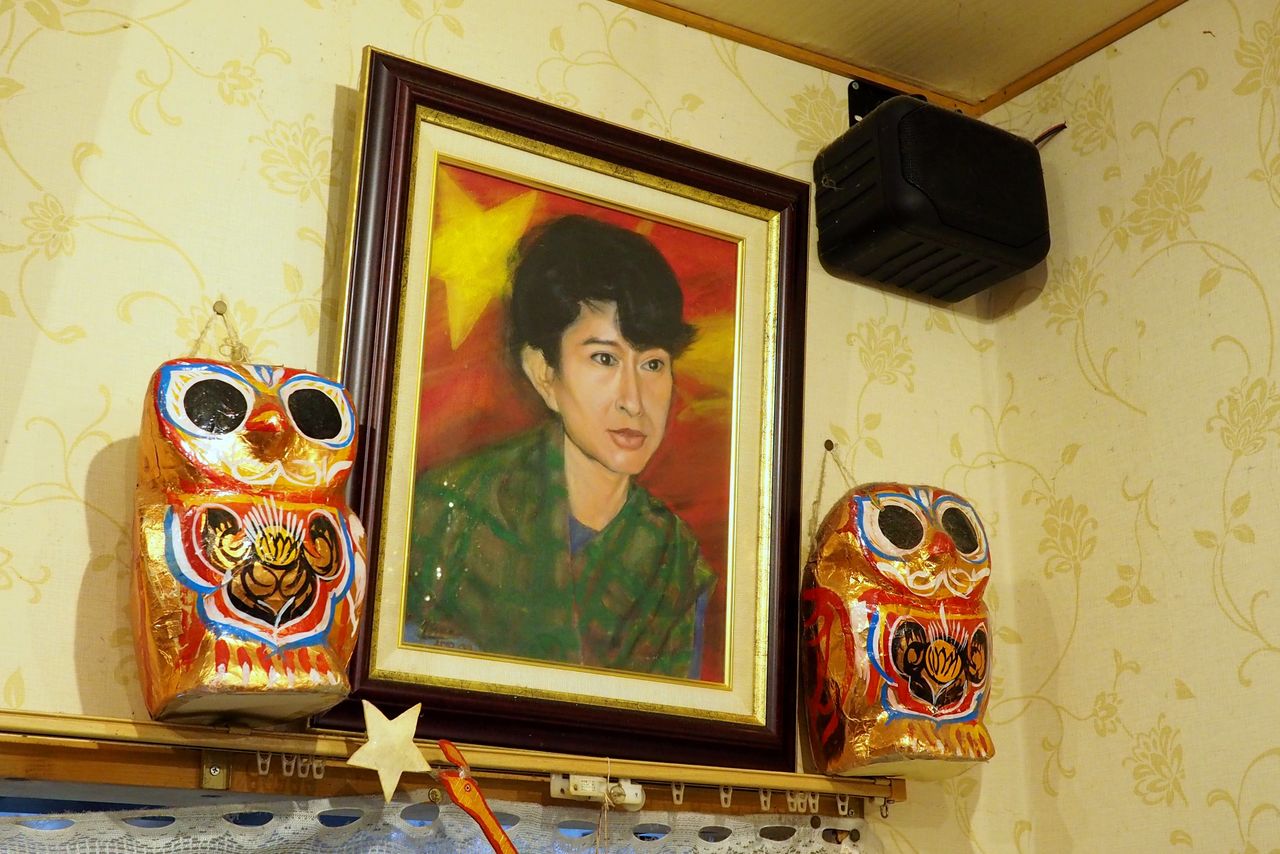
A portrait of Aung Suu Kyi hangs on the wall of Swe Myanmar. (© Fuchi Takayuki)
He began engaging in underground activities using a pseudonym. But in time Than Swe’s cover was blown, and suddenly his life in danger. He appealed for help to a friend who was working at the Japanese embassy in Yangon.
“At the time, the only countries that would accept a Myanmar passport were Thailand, Singapore, Japan, and South Korea,” Than Swe explained. “But Thailand and Singapore were on good terms with the junta, and there was a danger I’d be forcibly repatriated if I went there. A friend of mine worked at the Japanese embassy, and I thought my only hope was to depend on Japan.”
He sent an SOS to his friend. Usually it took nearly a month to get a visa, but for some reason Than Swe’s was issued within the day.
“When he heard about my situation the ambassador himself intervened to help me,” he says today. “I still don’t know that gentleman’s name.”
It seems that the Japanese ambassador in Myanmar shared the spirit of Sugihara Chiune, the Japanese diplomat in Lithuania during World War II who famously issued life-saving visas to Jewish refugees suffering under Nazi persecution.
Ten of Than Swe’s compatriots were also arrested with him. Eight were eventually released and were able to secure political asylum in the United States, but the other two died in prison. You can glimpse the harshness of the repression from these tales.
Thirty Years Without Seeing Home
It was December 1989 when Than Swe finally set foot on Japanese soul. The money he had brought with him was gone in a flash, and he was forced to sleep rough under the cold winter sky.
At this rate he knew he would soon die of hunger or exposure. He finally managed to find work at a construction site. It was a dangerous job, but he flung himself into it. The president of the contractor was impressed by his hard work and helped him out in various ways. It was thanks to the president’s intervention that he was able to finally bring his fiancée to Japan—Than Than Kyaing, today the proprietress of Swe Myanmar.
The couple opened their restaurant in 2012. Than Swe built the interior all by himself, using the skills he had honed on construction sites.
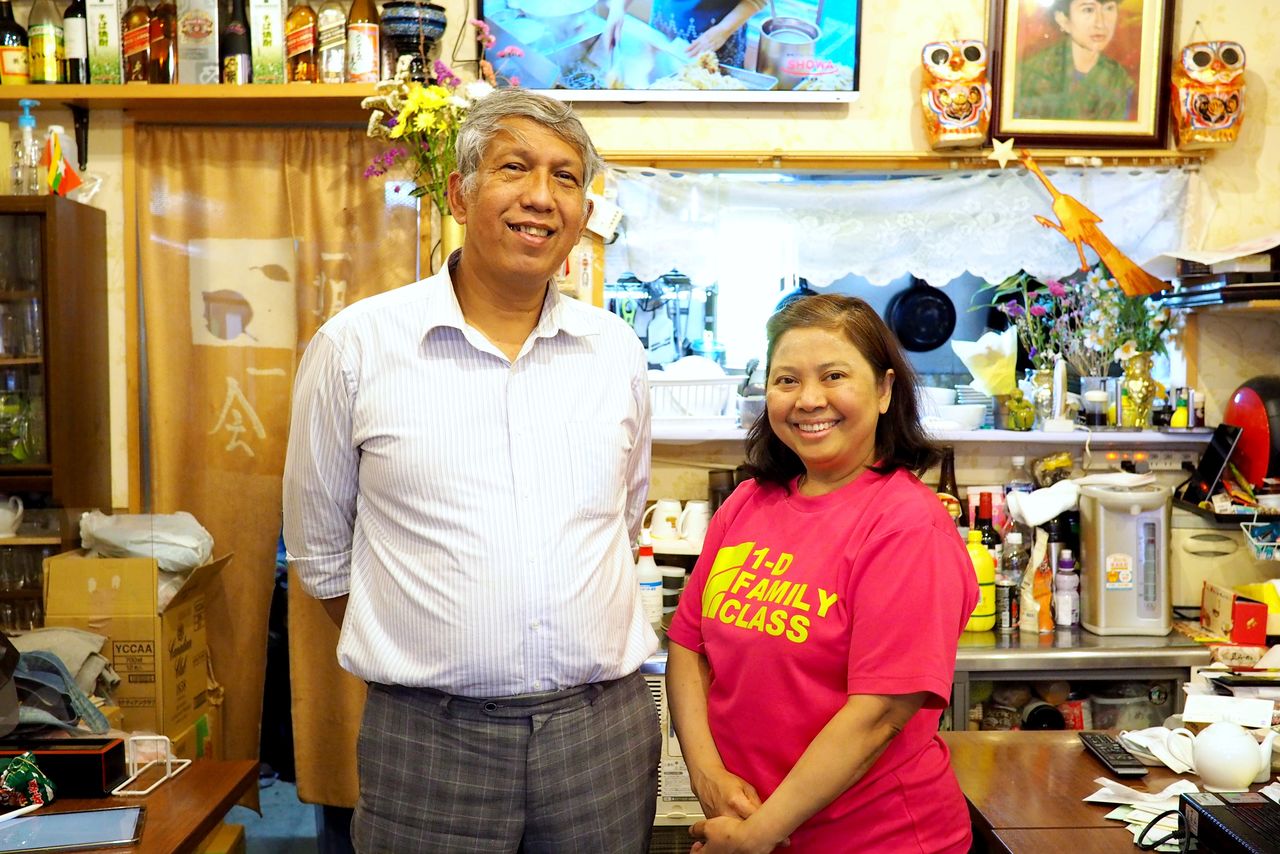
The friendly smiles of Than Swe and his wife, Than Than Kyaing. (© Fuchi Takayuki)
When Than Swe first fled to Japan with his life hanging by a thread, he was sustained by his belief that the junta would fall in a year or two, and he would be able to return home. He was almost right. Myanmar’s democratic forces did win the next election in 1990, but the armed forces refused to accept the election results, and there was no change of regime.
It would not be until 2015, 25 years after Than Swe reached Japan, that democracy finally returned to Myanmar. He was overjoyed at the thought that he would finally be able to set foot again on the soil of his homeland.
Yet today, six years on, Than Swe’s dream of regaining his Myanmar citizenship and finally returning home goes unfulfilled. That is because of two unexpected disasters: yet another military coup-d’état, and the COVID-19 pandemic.
“I and forty of my comrades in similar situations had all planned to visit Myanmar in February 2020,” Than Swe told me. “We were going to apply to regain our citizenship and even do some sight-seeing on the side. We were really looking forward to it, but thanks to the pandemic all the flights were cancelled.”
Yet Than Swe and his friends have not given up hope. “Time solves all things,” as the saying goes, and once the pandemic has been brought under control they will be able to travel again.
Even under the shadow of the coronavirus, however, there was one joyful event last year. On November 8, 2020, for the first time in his life, Than Swe was finally able to vote in a general election held in his homeland. There are many other of his compatriots who also had to flee to Japan under similar circumstances, and the expatriate voting at the Myanmar Embassy in Tokyo was flush with an emotional, almost festive mood.
“My friends and I created an organization to help get out the vote,” he told me. “We guided our comrades who travelled to Tokyo from all over Japan to the embassy, provided them with places to stay while they were here, and did everything we could to help with the voting. When I cast my own ballot, I felt so strongly that I was a citizen of Myanmar again. During all the years I have lived in Japan, I was always a refugee. I was never able to have a clear sense of who I was.
“And the election, you ask? We were all overjoyed. It turned out just the way we wanted.”
Now all we need is to get the pandemic under control, Than Swe thought. Yet destiny was to intervene yet again, overturning his hopes one more time. On February 1 he was devastated by fresh news from his homeland. It came like a thunderclap: another military coup.
Resisting the Junta from Takadanobaba
Than Swe was hardly going to watch latest political chaos back home without taking any action. Immediately after the coup, he and his compatriots established the organization Support CRPH-Japan. (CRPH is the acronym for Committee Representing Pyidaungsu Hluttaw, a group of elected members of Myanmar’s legislature who assert they are the legitimate government of the country.) Than Swe’s group supports democratic forces opposing the military junta back in their native land. Fundraising is a part of it, but they have also organized prodemocracy demonstrations in Tokyo. Even as I was interviewing him, his mobile phone was ringing continuously with calls from his compatriots.
“Back when I was young and first joined the democracy movement, my friends and I didn’t truly understand what freedom and democracy were all about,” he told me. “But thanks to the campaigns of those days, the democratization of Myanmar advanced. The young people who are heading the movement today aren’t like we were. Unlike our generation, they’ve already experienced a bountiful and democratic life for themselves. I keenly feel their anger at having something they have achieved stolen away from them like this. I fear we may be looking at civil war.”
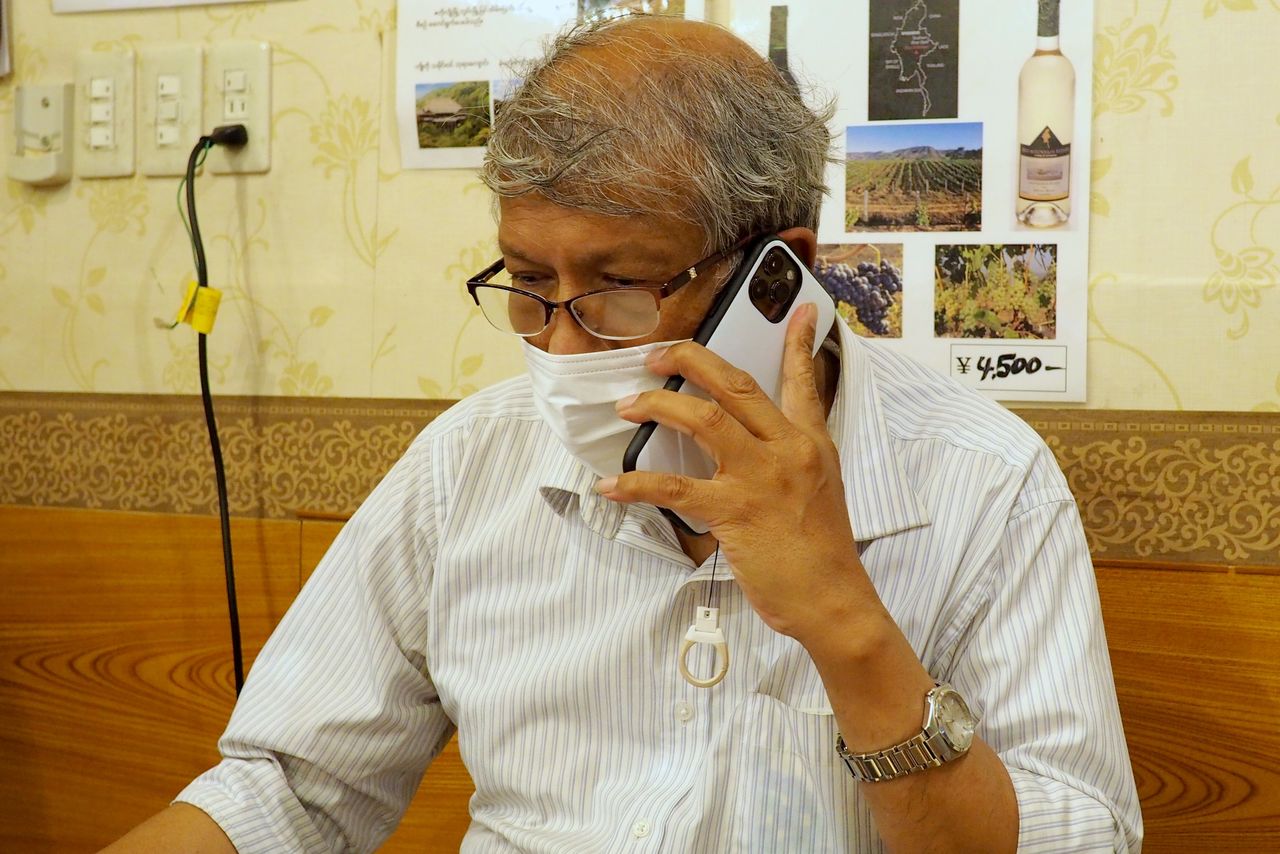
The ceaseless incoming calls testify to Than Swe’s fierce involvement. (© Fuchi Takayuki)
The situation in Myanmar has indeed continued to deteriorate, and as I write this, the military repression is said to have already claimed the lives of more than 800 civilians. Than Swe and his colleagues have appealed to parliamentarian leagues in the Japanese Diet with an interest in Myanmar affairs, but so far there has been no definitive response. This may be due in part to growing economic ties between Myanmar and Japan in recent years, with the military protecting the economic activities of Japanese companies operating in the country.
These events in Myanmar may seem distant to us today, but in fact, they are happening in our own backyard.
Swe Myanmar, the name of the restaurant that Than Swe and his wife have built together in Takadanobaba, means “our Myanmar family, our Myanmar friends.” Even in these heightened times the warm and gentle atmosphere of their establishment remains unchanged.
As I savor their le pet thop and danbauk, my thoughts turn again to the people back in the land of their birth. Perhaps this, too, can be a form of solidarity.
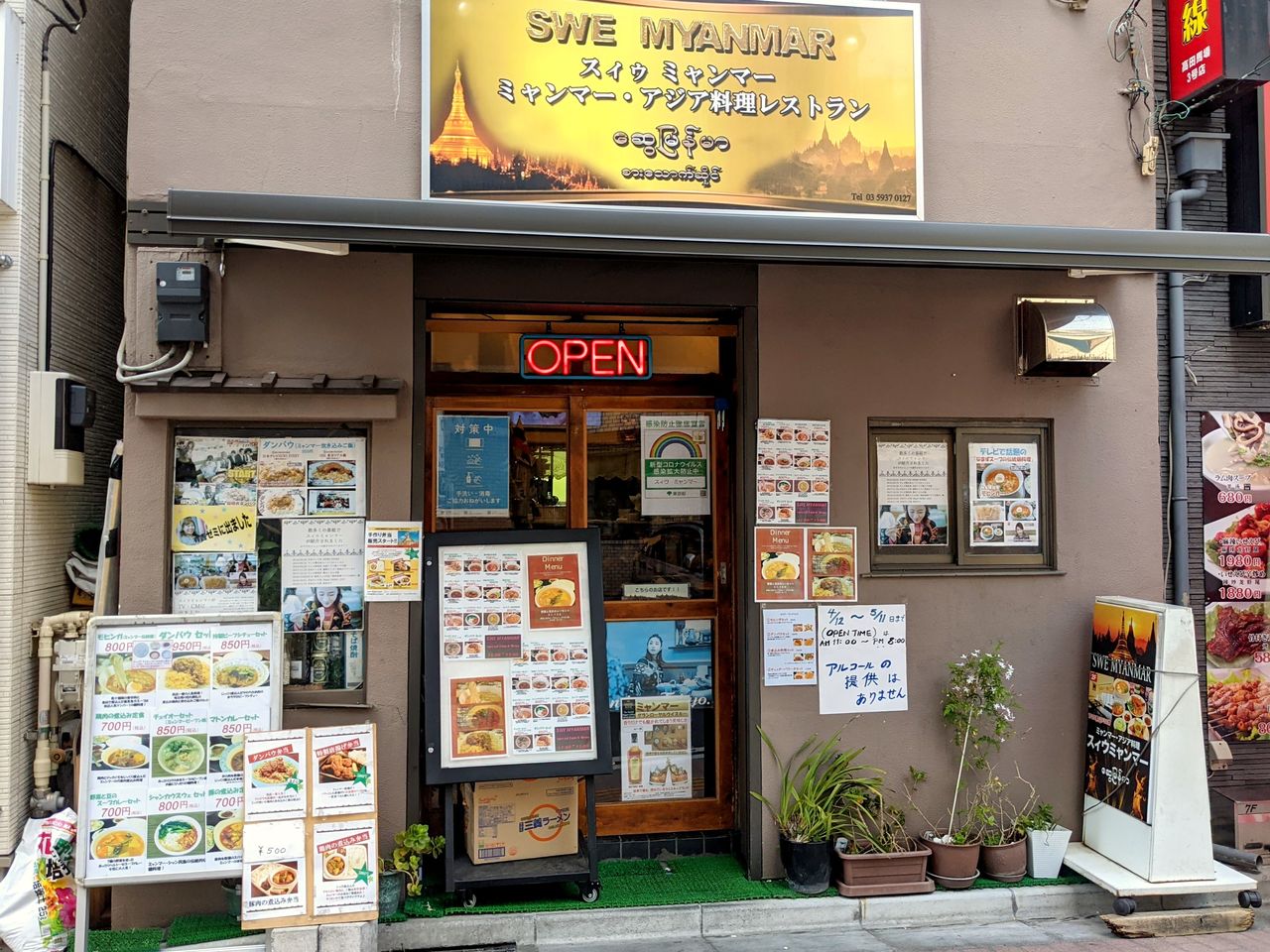
The Myanmar restaurant Swe Myanmar. (© Fuchi Takayuki)
Swe Myanmar
- 3-5-7 Takadanobaba, Shinjuku, Tokyo. Tel.: 03-5937-0127
- Three-minute walk from Takadanobaba Station on the JR Yamanote Line
- Hours: 11:30–15:00/17:00–23:00. Closed second and fourth Mondays of each month.
(Originally published in Japanese. Banner photo: Le pet thop, a classic Myanmar salad made with tea leaves, ¥850. © Fuchi Takayuki.)